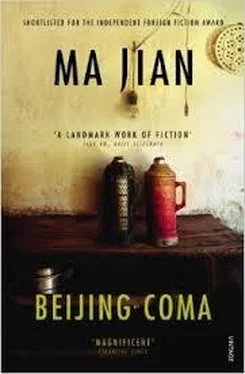‘There’s no need. This conversation is being taped. Give me your name and your title.’ The person on the other end of the phone sounded like a lowly secretary.
‘My name is Mou Sen. I am the deputy commander of the Hunger Strike Headquarters…’
Although he tried to keep his voice down, several people caught snippets of what he said. After he put the phone down, a journalist from Xinhua News Agency edged forward and asked for a copy of the statement. I told him there would be a press conference in front of the Monument later, and that commander-in-chief Bai Ling would read out the statement in person.
Mou Sen and I sat down, took swigs from the bottles of water a student had handed us and watched the colour drain from the sky to the west. Mou Sen said it would be difficult to impose martial law in Beijing. ‘When the government put Lhasa under curfew in March, they were able to cordon off the city and then attack the Tibetans away from the gaze of the Western media,’ he said. ‘But Beijing is filled with foreign diplomats and television crews. The whole world is watching us. The government wouldn’t dare use violence.’ Soon after he said this, his eyes rolled back and he collapsed in a sweaty heap on the ground. I pulled him up and took him back to the broadcast station to find him something to eat.
After I’d put him down on a quilt and given him some bread and peanuts, I went outside to organise the student marshal team. Rumours that the hunger strike had been called off had spread through the Square, and a large mob had gathered round the station, demanding to broadcast their views. Most of them were furious about the decision. The student marshals in yellow caps were struggling to hold them back.
‘Look at this leaflet,’ a sweaty man in his forties said, pulling me over. He looked like a government cadre. ‘It says that officials in ten government organisations have decided to join the fast. It would be madness to end your hunger strike now! Let me through so I can broadcast this news to the Square.’
‘Why not make copies of the leaflet and distribute them to the students,’ I said. ‘The broadcast station is packed at the moment.’
A woman with hair permed like my mother’s walked up to me and said, ‘If you end the hunger strike now, the government will assume you’ve surrendered and will crush you like flies once you return to your campuses.’
‘This is the seventh day of our hunger strike and the government still hasn’t responded to our demands,’ I said, as she was joined by a young woman on a bike. ‘In fact, we’ve heard rumours that they’re about to impose martial law. A hunger strike won’t be able to force any concessions from a government like this.’
‘We’re ending the hunger strike, but our protests will continue,’ Chen Di explained to a middle-aged man in front of me. ‘We’re now going to hold a sit-in instead.’
Exhausted from the constant jostling and shoving, I stepped aside for a moment and asked Mao Da and Zhang Jie to tell the provincial marshals to collect their take-away suppers. Students from the Beijing campuses had been bringing meals to their classmates in the Square, which had created a lot of bad feeling among the provincial students, so Old Fu had given Big Chan and Little Chan 10,000 yuan to buy boxed meals for them.
Although the end of the hunger strike had still not been officially announced, many of the hunger strikers were starting to leave the buses. Some sat on the ground and stuffed biscuits into their mouths, others hobbled off to the emergency tent, propped up by medics in white coats. The ones who were too weak to move lay flat on the ground while doctors attached drips to their arms.
A man in a black shirt pulled me aside. ‘You’re the security chief, so that makes you one of the leaders, I suppose. In mid-June, there will be a meeting of the National People’s Congress,’ he said, pointing a big, grimy finger at the Great Hall of the People. ‘If you’re still in the Square when the meeting takes place, the government will never again be able to claim they represent the will of the people.’
‘Yes, that’s a good point,’ I said. My red armband had the words SECURITY CHIEF written on it. I’d discovered the only way I could disengage myself from these irritating people was to agree with whatever they said.
A man nearby handed me a cigarette then walked away mumbling, ‘The Chinese nation has reached the most dangerous juncture in its history, my friend!’
I continued to talk to the crowd, repeating that although the hunger strike was ending, our occupation of the Square would continue. My team of twenty marshals was struggling to keep the angry mob back. When the strain became too much, I sneaked back into the tent, sat down and fanned my face with my cap. My mouth was filled with ulcers, and it was painful for me to speak. I suspected that Tian Yi wouldn’t be too upset about the decision to end the strike, but many other hunger strikers had taken the news badly and had had to be rushed to hospital.
Ke Xi walked in. I presumed he’d had another good meal, because he was standing straight as a rod now, and although he still had his two bodyguards with him, the nurses and doctor had gone. ‘I’ve come to tell you that I’ve set up an Interim Command Centre,’ he announced.
‘That’s a good idea,’ I said. ‘The Hunger Strike Headquarters should disband now.’
‘And what’s your Interim Command Centre going to do?’ Mou Sen asked, gobbling a biscuit Nuwa had given him. The biscuits were a Hong Kong brand. The message MAY EVERYTHING GO AS YOU WISH! was printed along the side of the tin.
‘It will take control!’ When Ke Xi glared at you with his eyes wide open, he looked as if he suffered from a hyperactive thyroid.
‘What will be your relationship with the other student organisations?’ I asked.
‘I will be commander-in-chief,’ he said, ignoring the question.
‘Will you be calling for the students to leave the Square or to continue the occupation?’ Mou Sen asked.
‘I will be commander-in-chief,’ he repeated in a daze.
Mou Sen shook his head and sighed.
‘You’ve lost your mind, Ke Xi,’ I said, pushing him out of the tent. ‘Go onto the Monument if you want to give a speech. We’re in the middle of a broadcast here.’ I watched him stagger away, then I sat down in the tent’s doorway to stop anyone else coming in. I knew the broadcast station would become the focus of any new power struggle in the Square.
Ke Xi climbed onto the Monument’s lower terrace and shouted through his megaphone. A large crowd of supporters gathered round him and cheered his every word. When he finished speaking, he passed his megaphone to one of his bodyguards and stepped down to shake hands with Beijing residents and sign the notebooks they thrust into his hands.
Mou Sen waved the Hunger Strike Termination Statement he’d been rewriting and said, ‘That’s it. I’m not making any more changes. Bai Ling can read it out at the press conference once she’s announced the end of the hunger strike to the students.’
‘They’re only taking orders from Sister Gao now,’ I said.
‘Well forge her signature here and tell them she’s approved it,’ he said pointing to the corner of the page.
‘Ask someone else to take it to them. I’m looking after this place.’ I didn’t want Nuwa to think I could be ordered around by Mou Sen.
It was nearly nine o’clock. Some of the hunger strikers had hobbled over to our broadcast station by themselves, others had been carried over on stretchers. But most of them were now gathered around the tent, listening to the tape of the Internationale and waiting for Bai Ling to make her announcement.
The hunger strikers didn’t know about the threat of martial law that was hanging over us, so when Bai Ling announced that the hunger strike had been called off, many of them felt betrayed. Someone shouted, ‘You’ve deceived us, you criminals!’
Читать дальше












